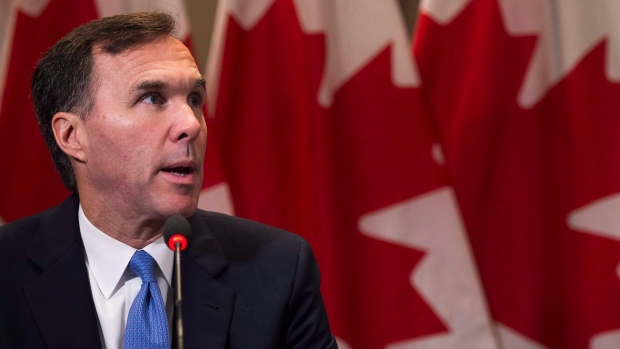May 12, 2017
Liberals hire firm to 'scour the world' for infrastructure bank CEO

The Liberal government has begun its search for a CEO to lead Canada’s new infrastructure bank. While the high-profile position is expected to attract candidates from around the world, industry observers say the job will require a certain style of leader.
“You would need someone with some grey hair, public respect, tons of energy, and the willingness to commit a lot of time,” former Alberta Investment Management Co (AIMCo) CEO Leo De Bever told BNN in an email. “This will likely be a thankless job. It requires someone with a very thick skin.”
This week, former Ontario Teachers’ Pension Plan CEO Jim Leech met with recruiters overseeing the search for a chief executive. A source familiar with the search tells BNN the government is working with executive search firm Odgers Berndtson. Leech was brought on board by Prime Minister Justin Trudeau to advise the government on the bank’s creation.
“The CEO will have to run the bank, write out a plan, hire people, create the right culture which will be so important,” Leech told BNN in a television interview. “There’s a lot of work to be done.”
Finance Minister Bill Morneau originally unveiled the government’s plan to create the bank during last fall’s economic update, following a recommendation from his Advisory Council on Economic Growth. The bank is expected to help fund massive infrastructure projects in Canada by attracting large institutions from around the world as partner investors. Its goal is to leverage up to five dollars in private money for each dollar the federal government puts in.
The government has said it plans to launch the infrastructure bank before the end of the year. Legislation for the bank is currently being debated in the House of Commons. And, as BNN was first to report, the bank will be headquartered in Toronto, which is already home to several leading pension funds with a history of investing in infrastructure. The bank’s mandate is to invest $35 billion, with $15 billion available for projects that don’t guarantee a full return on investment. The other $20 billion will be used to invest in equity or loans that won’t count against the government’s spending.
FINDING INTERNATIONAL INTEREST
While the government has reached out to institutional investors globally about partnering with the bank, it’s unclear how much capital these global players are willing to commit.
“I think the key to martialing this kind of international interest will be the nature and quality of the projects that come to the bank for consideration,” Mark Romoff, president and CEO of The Canadian Council for Public-Private Partnerships, told BNN in a television interview.
Meanwhile, opposition leaders have accused the Liberals of giving the private sector too much say in the bank’s creation.
“The infrastructure bank boondoggle is just another taxpayer-funded Liberal vanity project,” interim Conservative leader Rona Ambrose recently said during question period. “I know the Liberals are excited to impress their friends on Bay Street and Wall Street, but it is one thing to buy them tickets to a Broadway show. It is quite another thing to buy them a $35-billion bank.”
“To be honest, I could not come up with people that would have both the skills and the stomach,” De Bever told BNN in an email.
“I agree with Jim Leech that the CEO should be someone with financial acumen and a great team leader, but I'd also add they should be strongly committed to ensuring the public/taxpayers get good value for their money and committed to transparency and accountability,” Toby Sanger, an economist with the Canadian Union of Public Employees told BNN in an email. “On this basis, I'd suggest Kevin Page, former Parliamentary Budget Officer, who embodies all these qualities. Although, I suspect they’ll probably go for a former banker, such as Ed Clark.
“I have not been contacted,” Kevin Page told BNN in an email. “I have a great job.”
As for Clark, a source told BNN the bank’s creators have not reached out to him, nor would he be interested in the role.
One infrastructure investment executive who privately expressed interest in running the bank noted the CEO pick will also depend on the make-up of the bank’s board of directors.
“The executive search firm has been retained to scour the world for qualified and interested candidates,” said the executive, who asked not to be named. “But the first order of business is a board and a chairperson. The board and its chair will have significant influence determining the skills, characteristics and experience desired of the CEO.”
“A healthy fit and working relationship between the chair and the CEO will be critical to success,” Richard Leblanc, a governance professor at York University told BNN in an email. “Former political leaders would have government interface ability, as well as consensus building ability, and an unblemished record, which is also needed. John Baird, who served as Foreign Affairs Minister in Stephen Harper’s cabinet, immediately come to mind. As does Frank McKenna, former Canadian Ambassador to the U.S. Ultimately, the party affiliation is not important, but rather the knowledge of government machinations, which is very complex.”
When BNN contacted McKenna, who currently serves as deputy chairman at TD Bank, he said he has not been contacted and does not have interest in the position. As for Baird, who is currently a senior advisor at Bennett Jones, he responded “Lol ... no,” when asked by BNN about whether he’s been contacted or has any interest in the position.
